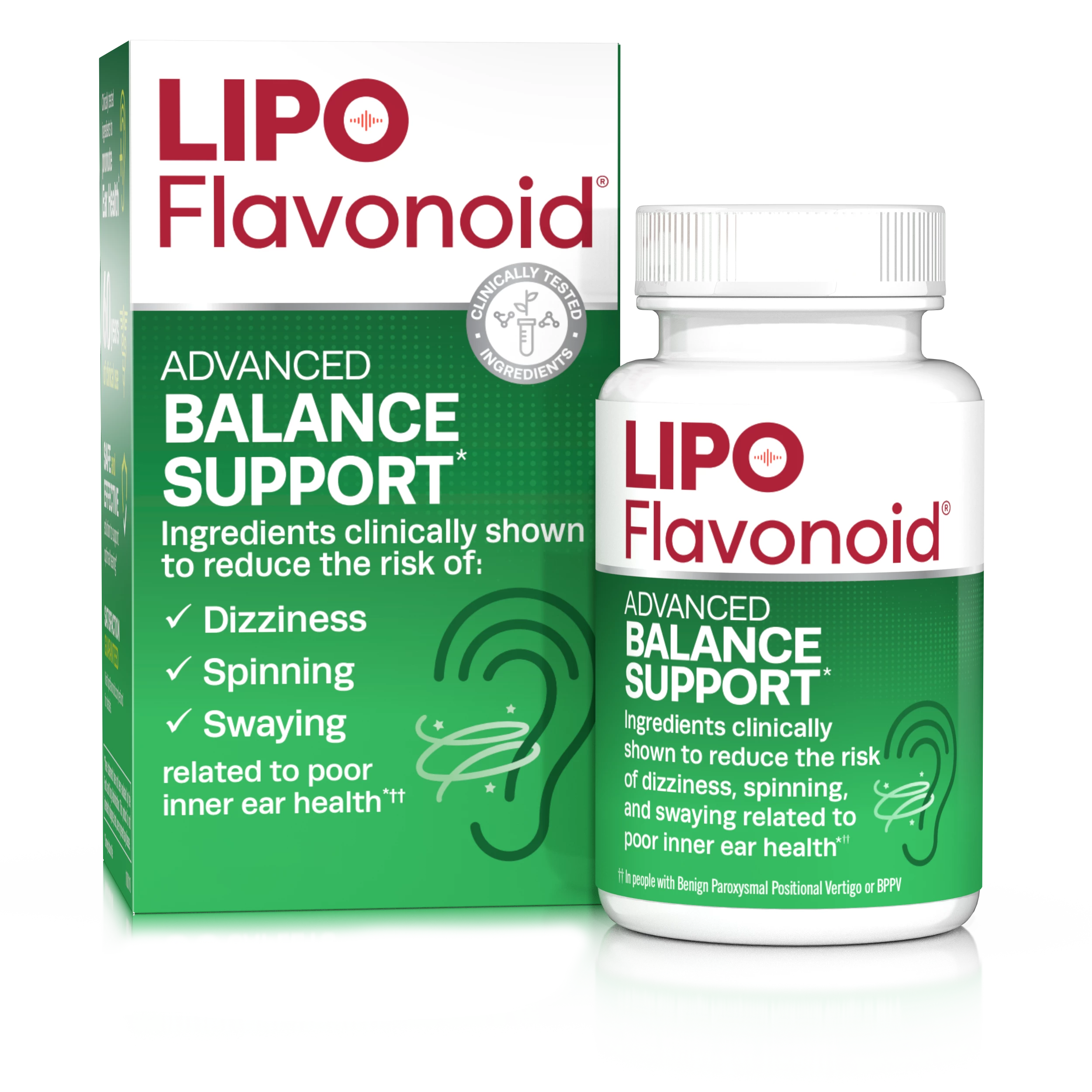- Products
- Science
-
Resources
- Tinnitus Resources
- What is tinnitus?
- Causes of tinnitus
- Tips for managing tinnitus
- Prepare for your doctor's visit
- PTSD and tinnitus
- Tinnitus FAQs
- Hearing Loss Resources
- What is hearing loss?
- Degrees of hearing Impairment
- Types of hearing loss
- Causes of hearing loss
- Treatment options for hearing loss
- Find a store
- My Account
-
-
- Healthcare Professionals
Causes of Vertigo and Balance Problems
If you're like most people, you've had to deal with a bout of dizziness from time to time. Whether your head spun after getting off a ship or felt a little loopy getting off of a roller coaster, most of us are familiar with the unsteadiness of vertigo.
However, around 90 million Americans visit healthcare providers each year with complaints of unexpected vertigo. Balance issues, ringing in the ears, and dizziness can be hard to deal with during your everyday life. Worse, it can be tough to understand what's causing your condition and to know when you should worry.
Though doctors can help address your symptoms, you may be glad to know that there are also options to get ahead of those symptoms at home.
Let's take a look at the common causes of vertigo as well as a few ways to be proactive on your own.
The Basics of Vertigo
First, it's important to understand that vertigo isn't a condition, disease, or diagnosis on its own. It's sometimes a symptom of other conditions, though it can also develop on its own. Certain medications or body movements, for example, can make you feel dizzy or off balance.
People experience vertigo in a number of different ways, which is why treatments for vertigo vary so wildly. Depending on the cause of your vertigo, you might get relief from medication and exercises at home. Some vertigo sufferers, however, will need physical therapy or surgery for their associated conditions.
Symptoms Associated With Vertigo
Most often, vertigo is associated with feeling like the world is spinning around you. Here are the most common symptoms of vertigo:
- Dizziness, including motion sickness or a spinning sensation
- Lightheadedness or the feeling that you might faint
- Balance issues or unsteadiness
- Ringing in your ears
- In addition to these main issues, you might experience some of these less common symptoms:
- Nausea and vomiting
- Headaches
- Fatigue
- Difficulty hearing
- Feelings of pressure or fullness in your ear
- Eyes flitting back and forth (nystagmus)
- Blurred vision, especially when moving
- Difficulty concentrating
- Confusion
Again, different people can experience vertigo in different ways, so your vertigo may not be an exact match for someone else's. Your symptoms may also come and go over months or even years.
Types of Vertigo
There are two main types of vertigo to consider.
The first is peripheral vertigo. This type of vertigo happens when there's a problem with your inner ear or vestibular nerve. Our Advanced Balance Support formula can help reduce the risk of vertigo-like symptoms related to poor inner ear health*.
Central vertigo, on the other hand, happens when a serious health condition affects your brain. Strokes and traumatic brain injuries, for example, can lead to the symptoms we mentioned above. Central vertigo sufferers should seek medical treatment, as it's difficult and dangerous to manage these types of conditions at home.
In the common vertigo causes we'll discuss below, we'll be looking at causes of peripheral vertigo only.
Common Causes of Dizziness
One of the most common symptoms of vertigo is dizziness. You might feel like you're motion sick, or you might feel like you or the world around you is spinning. Unless you're feeling dizzy coming off a ride at an amusement park, here are a few common causes of this feeling:
Benign Paroxysmal Positional Vertigo (BPPV)
This is the most common culprit when it comes to peripheral vertigo. BPPV happens when the delicate parts of your ear, the calcium crystals that help you balance, are out of place. This condition is also more common in women.
Meniere's Disease
If you're experiencing both ringing in your ears and dizziness, Meniere's disease may be the culprit. People who suffer from Meniere's may also notice buzzing or feelings of fullness in their ears as well as hearing difficulties that come and go. These episodes often last for only short periods.
Migraine
Certain types of migraines known as vestibular migraines can cause dizziness. Women are five times more likely to experience this kind of migraine. Associated symptoms include nausea and sensitivity to motion.
Head Injury
Concussions and head trauma can cause dizziness, even when you're lying down. If you've had a recent injury, you may also experience nausea, headaches, and confusion.
Infections and Inflammation
Certain infections can cause swelling in the part of your ear that affects balance. This includes conditions like vestibular neuronitis and labyrinthitis.
The result can be feelings of dizziness as well as nausea, vomiting, and rapid eye movements. The good news is that these symptoms tend to improve within a few days as the infection fades.
Common Causes of Lightheadedness
Lightheadedness has a huge range of causes, making it impossible to go through them all here. However, here are a few common reasons why you might feel lightheaded:
Postural Hypotension
If you tend to feel faint or dizzy when you change positions too fast, you might have postural hypotension. This can cause your blood pressure to drop, leading to feelings of lightheadedness. There are many different root causes of postural hypertension, including dehydration, high blood pressure, and diabetes.
Nutritional Deficiencies
Certain nutritional deficiencies can wreak havoc on your health and cause lightheadedness. One common culprit is an iron deficiency, which can lead to anemia and reduce the number of healthy blood cells in your body.
The good news is that getting more essential nutrients in your diet can correct this issue. In general, eating with ear health in mind may help protect you from additional balance or auditory issues.
Medication Side Effects
Certain medications can make you feel lightheaded, so you may want to do some troubleshooting with your usual pills if it happens often. This is especially common in prescriptions that lower your blood pressure or cause frequent urination.
Common Causes of Balance Issues
Some of the conditions that cause balance problems are the same as those causing dizziness or lightheadedness. Meniere's disease and inner ear infections, for example, can cause balance issues in addition to dizziness.
However, there are a few other reasons you might be unsteady on your feet:
Acoustic Neuroma
This type of benign tumor can develop near the nerves that lead from your inner ear to your brain. Because it puts pressure on these systems, it can affect your balance and make it harder to hear.
Mal de Debarquement Syndrome (MdDS)
One of the most mysterious balance disorders is MdDS. French for "sickness of disembarkment," this condition is a feeling of seasickness, swaying, or rocking that continues long after you've left a boat. This condition can last for months or years, though doctors aren't sure why.
Vertigo Treatment at Home
If you have persistent vertigo, your doctor can help you understand the most likely causes. From scheduling labs that check for anemia to offering treatment options for a head injury, they're your best bet for addressing the root issue.
However, you may also be able to solve the problem or supplement your treatment on your own at home. Again, this depends on the causes of your vertigo, as certain types of inner ear vertigo are easy to treat at home.
Exercise
For some people, certain exercises can be an effective way to treat vertigo. Balance exercises can help you train your movements and strengthen the muscles you depend on for balance. Regular exercise can also help you reduce the risk of falls while you're in the midst of a vertigo episode.
Dietary Supplements
Many people find that certain dietary supplements go a long way toward dealing proactively with their dizziness, addressing their tinnitus, and managing other issues. This is especially true for people whose vertigo stems from poor inner ear health. That's where our supplements come in!
Lipo Flavonoid's Balance Support formula includes ingredients that can help you get ahead of many of the symptoms we've listed above. From dizziness to lightheadedness to balance issues, these daily pills can support your proactive treatment.
This is the newest form of treatment and is very exciting due to it being low cost, easy to incorporate in your everyday life, AND the best way to get PROactive about Vertigo instead of reactive.
Clinical testing has shown that our unique blend of vitamins and minerals may help promote overall ear health.* Here is a closer look at each ingredient in the unique formula:
- Ginkgo Biloba: improves blood flow throughout the inner ear
- Vitamin D: supports nutrient absorption in the inner ear
- Bioflavonoids: support healthy inner ear functioning
- B-complex vitamins: offer neurological support for inner ear neurons
Because they're allergen-free with no artificial coloring, anyone can take these easy-to-swallow pills.
Address Your Inner Ear Vertigo Today
Inner ear vertigo can be frustrating to handle alone. If you're dealing with lightheadedness, balance issues, ringing in your ears, and dizziness, you may struggle to get through your day.
Fortunately, there's a lot you can do for vertigo treatment at home! Paired with help from your doctor, our supplements may help retain your balance and stop tinnitus and associated symptoms before they start.* Check out our advanced balance support supplement on Amazon or at your closet retailer today!


